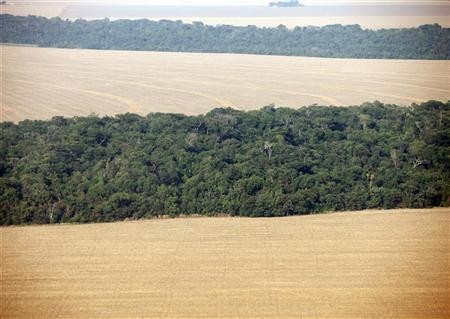Amazon Deforestation up by 33%
Deforestation in Amazon increased by 28% this year, as revealed by recently released satellite data.
The increased rate of deforestation in the Amazon jungle, which covers an area about as large as Western Europe, is viewed as a matter of grave concern by Greenpeace activists.
Rates of deforestation have been declining in recent years.
The satellite starts collecting data for monitoring Amazon cover during the dry season each August when the sky is free of clouds.
Last year estimates showed that only about 4,571 sq km (1,765 sq miles) of land was deforested, which was the lowest level since monitoring started about 25 years ago, according to BBC.

However, the area deforested between August 2012 and July this year is estimated to be 5,843 sq km (2,255 sq miles), which could point to a potential reverse trend.
Activists blamed the increase in destruction of forest on a controversial bill introduced last year by Brazilian Congress, which had altered forest protection laws.
"You can't argue with numbers," said Marcio Astrini, coordinator for the Amazon campaign at Greenpeace, the environmentalist group.
"This is not alarmist - it's a real and measured inversion of what had been a positive trend."
The much-debated forest protection bill was passed in April last year, which eased rules on amount of forest farmers must preserve, even though the bill clearly required millions of hectares of cleared land to be replanted.
The law gave more space to federal states to decide on the proportion of forest to be supplanted for logging. The bill allowed landowners to count woodland on river margins, hilltops and steep inclines among the total proportion of forest to be preserved on their land, while before the bill these were not included in the required conservation on their properties.
National Agriculture Confederation in Brazil had defended the bill on the grounds that it would enable rules to be set suitable to characteristics of different regions.
Deforestation in Brazil had slowed considerably in recent years on account of greater law enforcement and use of satellite imagery to track areas suspected of non-compliance.
Farmers had contended that the bill would lead to net gain of millions of hectares of forest coverage.
One government official had estimated a couple of years back that 24 million hectares (59 million acres), an area equal to the size of the United Kingdom, would be reforested as a result of the bill. But experts had said that the area to be replanted will be difficult to gauge in near-term until more data was collected about rural properties, according to a report published by Reuters last year.
Izabella Teixeira, Brazil's environment minister, dismissed criticisms that the amended forest protection laws were responsible for increased deforestation rate.
She pointed to the long-term decline in deforestation over the past decade and that the deforestation drive was headed in right direction. According to her, government aims to "eliminate illegal deforestation in the Amazon".
According to a report by WWF, illegal logging is a major problem in Amazon, and it comes with an additional cost of lost revenue, as when trees are cut without permits and are smuggled abroad, governments lose out revenue from taxes and duties, coupled by costs of policing illegal logging.
Last year BBC had reported that despite tough regulations, "unscrupulous" loggers were selling illegally acquired wood as legal timber in the market, by using forged papers.
© Copyright IBTimes 2024. All rights reserved.






















